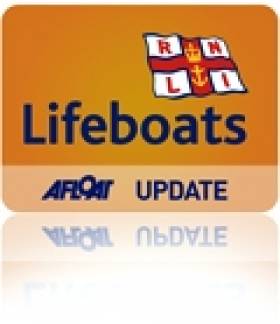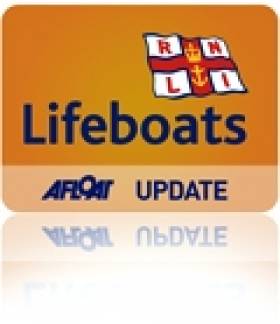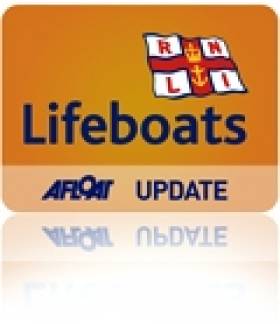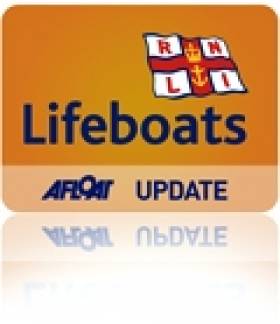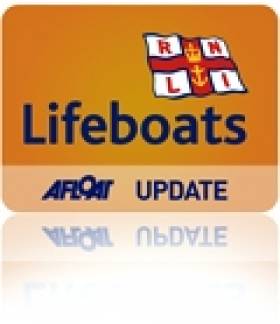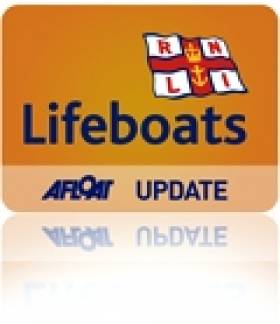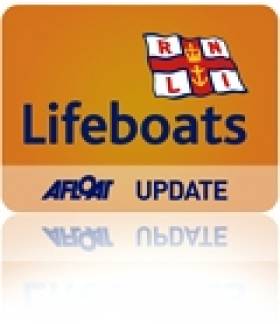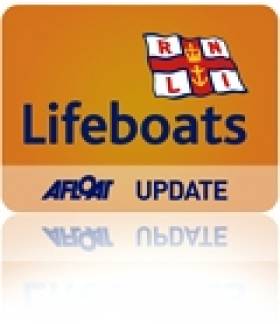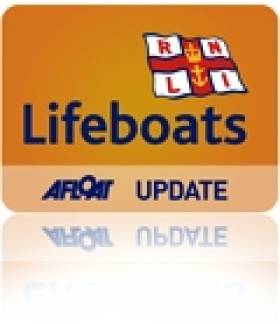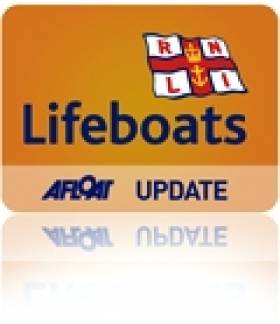Displaying items by tag: RNLI
Clifden RNLI Upgrade Inshore Lifeboat to New Atlantic 85
#rnli – Clifden RNLI have this week taken delivery of a new Atlantic 85 lifeboat at the station. The lifeboat is named Joyce King and will be replacing the Atlantic 75 lifeboat that has been on service in the Galway lifeboat station since 1999. This is not the only new arrival expected at Clifden as the crew also await the delivery of an all-weather lifeboat, which will be trialled there for a year, to work alongside an inshore lifeboat.
The Atlantic 85 lifeboat has some improvements on its predecessor and the lifeboat crew have been spending most of the week familiarising themselves with the new boat. The new lifeboat can operate in conditions up to a force seven and further to the Atlantic 75, allows for a fourth crewmember, more survivors and more kit onboard. The vessel is powered by two 115 horsepower engines, is composed of a strong hull and has a top speed of 35 knots. The added radar allows the crew to operate more effectively in poor visibility and to locate vessels in difficulty faster.
It carries a full suite of communication and electronic navigation aids, including VHF radio, as well as a searchlight, night vision equipment and illumination paraflares for night-time. Four out of ten RNLI callouts occur in the hours of darkness.
In keeping with the RNLI practice of ensuring that lifeboats are kept maintained to the highest standards and are routinely refitted every few years, Clifden RNLI's Atlantic 75 will go on to serve at another lifeboat station in Enniskillen. In the fourteen years the Benjamin Downing Fairbridge Atlantic 75 lifeboat was at Clifden RNLI it launched 115 times and brought 97 people to safety.
The new lifeboat has been made possible by a legacy from Mr John Charles King of Lincolnshire in England. Mr King passed away in 2009 and on his death requested that a lifeboat be named Joyce King in memory of his wife. There are no surviving relatives and very little is known of Mr and Mrs King. Through their generous bequest they have funded the Clifden lifeboat which will be put to use launching off the west coast of Ireland to those in peril on the sea.
Commenting on the arrival of the new Atlantic 85 lifeboat at Clifden, Owen Medland RNLI Divisional Operations Manager said, "We've had a very busy week here with all the RNLI crew and station management. The arrival of a new lifeboat is always an exciting time for any station and it is accompanied by an intensive week of training and familiarisation with the new boat by all concerned. This is a particularly challenging part of the coastline and this new lifeboat will assist the crew in their work saving lives at sea and assisting those in difficulty."
A date for the arrival of the all weather lifeboat to be trialled at Clifden RNLI has yet to be confirmed and will be announced in due course by the charity
Donaghadee RNLI Rescues Man In Boat Breakdown
#RNLI - Donaghadee RNLI has rescued a man after his boat got into difficulty off the Co Down coast.
- In good weather conditions, the volunteer crew launched the all-weather lifeboat at 3.07pm yesterday (Wednesday 26 June) to go to the aid of a casualty off Mew Island.
It followed a request by Belfast Coastguard which had received a call from the owner of the 4m boat to say his vessel had broken down and had starter motor problems.
The lifeboat located the boat north of Mew Island, where it was taken safely under tow by the crew and brought to Donaghadee Harbour.
Earlier in the week, a group of young people from the RNLI Storm Force visited the Donaghadee lifeboat station for a guided tour that emphasised the importance of safety on the water.
The children and their parents were given a warm welcome by coxswain Phillip McNamara and members of the station, who explained the work they do when they respond to emergencies - including getting into their lifeboat gear and jackets in a hurry!
Wicklow Lifeboat Launched to Free Boat from Lobster Pot
#rnli – The Wicklow inshore lifeboat was launched at 1800hrs last night after the Coast Guard received a call for assistance from a small boat with four people onboard.
The alarm was raised after the boats propeller got fouled in lobster pot ropes a short distance off Wicklow harbour.
The inshore lifeboat RNLB Sheringham Shanty men was launched within 5 minutes of the pagers activating under the command of (Helm) Barry Spencer.
The occupants of the boat were able to free the ropes and motor back into the harbour as the lifeboat was approaching.So no further assistance was required.
Operations Manager Des Davitt said 'This was a typical fast response by the lifeboat crew who launched five minutes after their pagers activated. '
The crew on the call out were (Helm) Barry Spencer, Alan Goucher and Connie O Gara.
Skerries RNLI Responds To Concerns Over Shore Walkers
#RNLI - Skerries RNLI in North Co Dublin were requested to launch by the Irish Coast Guard on Monday evening (24 June) following a call from a concerned member of the public regarding a group of people walking back to shore from Shenick Island.
The volunteer lifeboat crew launched their inshore lifeboat Louis Simson shortly before 9pm and proceeded directly to scene.
The caller had reported that the group were attempting to walk ashore from the island and were already in water up to their waists. However, shortly after arriving on scene, communication was received from Skerries Coastguard that the people in question had made it safely to shore.
Before returning to base, Skerries also requested the lifeboat to check on another group of people who were on the shoreline of Colt Island. This turned out to be a group of kayakers who were simply having a rest so the lifeboat was stood down and returned to station.
Speaking afterwards, Skerries RNLI volunteer lifeboat press officer Gerry Canning said: "It’s not unusual for people to get caught out by the quickly rising tide. We would encourage people to check the tide tables and always allow plenty of time to get to where you are going safely."
In related news, an updated and interactive edition of the RNLI’s safety handbook Sea Safety: The Complete Guide is now available free online.
The Complete Guide is the RNLI’s handbook of essential information for all those who go to sea. Its new interactive format – including videos, quizzes and challenges - means that sea safety is available on mobiles, tablets and laptops and at the tip of boaters’ fingertips.
RNLI coastal safety manager Tony Wafer said: "The Complete Guide gives more in-depth advice on how to follow these principles and stay safe on the water. It’ll cover everything from how to plan your time on the water, what safety equipment to take and how to use it, and what to do in an emergency."
#RNLI - New Zealand man Greg Murphy and his wife Anne have made an emotional journey to Arklow RNLI to visit the lifeboat station where more than a century ago the lifeboat crew set out in heavy seas and torrential rain to save the life of his grandfather.
In 1897 James Murphy was just a teenager when the schooner he was on ran aground and he was saved by Arklow RNLI lifeboat crew.
The details of the call-out were recorded by then honorary secretary of the Arklow lifeboat, James Tyrell, and paint an extraordinary picture of a dramatic rescue which began at 9.45am on 28 March 1897.
James was on the schooner Express with his father, uncle and two crew en route to Wexford from Dublin when in strong winds and driving rain the vessel grounded off Arklow. The skipper was washed overboard and lost.
The Arklow lifeboat - Frances and Charlotte, a pulling and sailing lifeboat under the command of coxswain Richard Wadden - was launched and the lifeboat crew rowed through breaking seas to reach the stricken vessel.
The account goes on to detail how, on rounding the stern of the vessel, the lifeboat itself was filled by “a fearful sea” but emptied seconds later.
The hull of the schooner was under water when the lifeboat neared her and four crew members, including young James Murphy, were clinging to the rigging. In difficult conditions the lifeboat crew cast a line and secured it to the rigging with the plan to get the men to fasten themselves to the rope together and jump overboard.
However it is not known whether they did not hear or understand the instructions, but they only tied James to the rope and lowered him into the water.
He was hauled toward the lifeboat but there was not enough slack to get him onboard and the lifeboat crew shouted to the men to let him go or he would drown. They did so and the lifeboat crew recovered the boy onboard almost lifeless.
Tragically the stranded men had cast off the line and all contact with the wreck was severed. Attempts were made to again throw a line to the men but it was without success. Ultimately the mast went over into the sea, taking the men clinging to the rigging with it and they were lost. The lifeboat crew tried to recover them but were unsuccessful. It was to be the last callout for coxswain Wadden, who retired a short time later.
In subsequent months the Murphy family relocated to New Zealand. But they never forgot the story of the schooner Express and the actions of the Arklow lifeboat crew.
On visiting the lifeboat station more than 116 years later with his wife Anne and meeting with some of the present-day crew, Greg Murphy commented: “On behalf of myself and my very large family back in New Zealand, I want to say thank you for what you do.
"Without the bravery of the men of the Arklow lifeboat back in 1897 myself and my family simply would not exist. Thank you all so very much.”
Larne RNLI Assists Yacht While On Call-Out For Drifting Boat
#RNLI - While on exercise on Sunday morning (23 June 2013), Larne RNLI’s inshore lifeboat was requested to divert and investigate reports that a boat was drifting out to sea in Larne Lough.
The 11m wooden boat had nobody onboard and represented a hazard in the area.
As the volunteer lifeboat crew neared the vessel they noticed a man in a punt approaching them. The man was from a nearby boat and having become concerned at the drifting vessel, had decided to investigate and see if he could assist.
However it was discovered that his nine 9m yacht, which had another crew member onboard, had also got into difficulty and was starting to drag its mooring.
Wind conditions were force four to five with a north gusting wind and lumpy seas.
The inshore lifeboat assisted the man back onboard his vessel and a lifeboat crew member joined him. The dragging mooring was fixed and they were able to continue under their own power.
The original drifting boat was aground, and having made sure the other vessel and its two crew were safe, the lifeboat returned to assist. Establishing a tow, Larne RNLI inshore crew were able to gently pull the boat off the rocks.
They were then met by the all-weather lifeboat and the tow was passed on to them before it was safely secured on a mooring in Larne Lough and both lifeboats returned to station.
Commenting on the call-outs, Larne RNLI lifeboat operations manager Alan Dorman said: “What started as a normal Sunday morning exercise turned into a double call-out for both lifeboats.
"It shows how quickly things can change out at sea and the lifeboat is always available to assist and reassure. Thankfully on this occasion help was close at hand and no injury or damage was done.”
Lifeboat Recovers Cow After Fall From Antrim Cliff
#rnli – Lifeboat crew with Red Bay RNLI have successfully recovered a calf after it fell down a cliff face yesterday afternoon. The alarm was raised at 1.45pm when a local farmer contacted Belfast Coastguard requesting assistance after one of his calves had fallen over a cliff and became stranded on a part of inaccessible coastline.
Red Bay RNLI lifeboat crew launched and located the calf near Cushendun in county Antrim. After assessing all options it was decided that the only way to recover the animal safely was take it in a harness and gently float it a short distance out to sea. Then it could be guided and brought ashore further up the coastline where the farmer could safely collect the animal.
The lifeboat crew returned to the station to collect more crew and equipment for the challenging recovery. The calf was carefully swaddled in a lifeboat trailer net and tethered to the lifeboat. The lifeboat crew then towed the animal slowly a quarter of a mile along to the coastline to safety and returned it to the relieved farmer.
Commenting on the unusual callout Red Bay RNLI lifeboat helm Paddy McLaughlin said, "This was not your usual callout for the lifeboat crew. When we heard the poor animal had fallen and was stranded, we felt we could help. With the RNLI you are trained for everything and we have great equipment. I'm not sure a lifeboat net has ever been used to recover an animal before, but there is a first time for everything. The calf did not seem to be injured after his fall and made his way back inland with the farmer after we dropped them off."
Windsurfer Sail in Water Prompts Dublin Bay Search Operation
#rnli – Dun Laoghaire's RNLI inshore lifeboat co-ordinated a search on Killiney Bay after a windsurfer sail was spotted drifting south of Dalkey Island by a passing yacht.
Seven boats searched the area with the R116 helicopter which joined the operation.
After a two-hour search, all units were stood down.
A person contacted the RNLI station to confirm their sail had been blown out to sea.
#rnli – The RNLI all-weather lifeboat at Dun Laoghaire launched shortly before 3pm this afternoon after a crew-member on a 70-foot racing yacht received suspected back injuries following a capsize on Dublin Bay.
The yacht was a 70 foot trimaran that had started a race from outside Dun Laoghaire's East Pier when it capsized fully throwing all ten persons on board into the water.
Race support boats and personnel including rescue divers and medical staff attended. The lifeboat was requested to assist with the evacuation of the injured crew member and two RNLI volunteers boarded the upturned hull with a spinal board and equipment.
The casualty was then transferred to the Irish Coast Guard helicopter R116 and flown to Tallaght General Hospital. It is understood that the casualty has not sustained life-threatening injuries.
The lifeboat remained on scene to co-ordinate the recovery of the trimaran which was taken under slow tow Dun Laoghaire harbour where a mobile crane and the team's shore crew prepared to right the vessel.
Lough Derg Lifeboat Launches Again, This time for Canoeists
#rnli – Following a major search and rescue operation on Lough Derg last night for 18 rowing boats the lifeboat (RNLI) at Dromineer was launched again this morning in a separate response to assist young canoeists in difficulty in heavy weather at Whitegate at the southern end of Lough Derg.
Lifeboat crew with Lough Derg RNLI launched this morning (Saturday June 22) after a request by Valentia Coast Guard to assist an unknown number of canoeists in difficulty in heavy weather at Whitegate, north of Killaloe.
The lifeboat crew was stood down after Valentia Coast Guard received information that all canoe had safely reached the Clare shore at Two Mile Gate.
At 11.19hrs on Saturday June 22 Valentia Coast Guard requested Lough Derg RNLI Lifeboat to launch to search for young canoeists (numbers unknown) in difficulty and unable to get to shore in gale force winds at Whitegate, north of Killaloe, on lough Derg.
The lifeboat launched at 11.30hrs with Helm Eleanor Hooker, Tom Dunne and Dom Sharkey on board. Winds were westerly, Force 6/7, gusting 8, with very poor visibility with rain and low cloud.
The lifeboat was stood down almost immediately by Valentia Coast Guard, when reports came through that the canoeists had safely landed on the Clare shore at Two Mile Gate.
Volunteer Lifeboat Helm said 'it is crucial to assess the weather conditions before going afloat and to be aware of the forecast, and to let people know when you are launching and when you will arrive at your destination'.
The lifeboat returned to station and was ready for service again at 11.45hrs


























